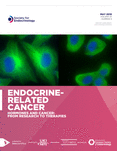Endocrine side effects of cancer immunotherapy
- 1Department of Endocrinology, Instituto do Cancer do Estado de São Paulo, Faculdade de Medicina da Universidade de São Paulo, São Paulo, Brazil
- 2Department of Oncology, Instituto do Cancer do Estado de São Paulo, Faculdade de Medicina da Universidade de São Paulo, São Paulo, Brazil
- Correspondence should be addressed to A O Hoff; Email: ana.hoff{at}hc.fm.usp.br
-
Figure 1
Suggested recommendation for biochemical evaluation and monitoring of pituitary dysfunction in patients treated with immunotherapy. $When using anti-CTLA4, anti-PD-(L)1 baseline and if symptoms persist on *2 years of follow-up, **high-dose steroids in patients with critical illness, in patients with severe hyponatremia, severe headache, visual abnormalities from pituitary enlargement and low-dose steroids (e.g. hydrocortisone 20–30 mg/day) with mild symptoms such as fatigue, mild headache. &Should be considered to selected premenopausal women. ACTH, adrenocorticotrophic hormone; FSH, follicle-stimulating hormone; fT4, free thyroxine; LH, luteinizing hormone; mo, months; T3, triiodothyronine; TSH, thyroid-stimulating hormone; WNL, within normal range.
-
Figure 2
Suggested recommendation for biochemical evaluation and monitoring of thyroid dysfunction in patients treated with immunotherapy. *Thyroid antibodies: thyroid peroxidase and thyroglobulin antibodies. **Radioactive iodine and technetium uptake is inaccurate in face of recent use of iodine contrast-enhanced imaging. fT4, free thyroxine; LT4, levothyroxine; TSH, thyroid-stimulating hormone; TSI, thyroid-stimulating immunoglobulin; tT3, total triiodothyronine; US, ultrasound.
- © 2017 Society for Endocrinology












